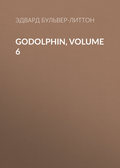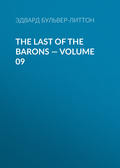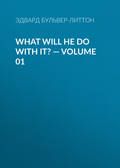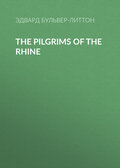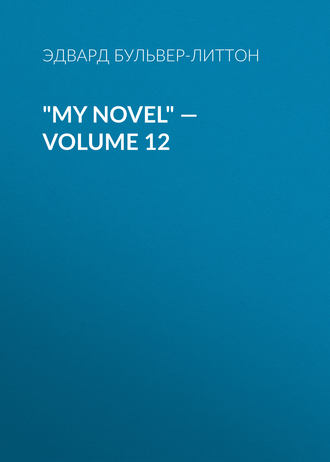
Эдвард Бульвер-Литтон
"My Novel" — Volume 12
But if Leonard dealt thus respectfully with Egerton, he had no such inducement to spare Randal Leslie. With the intuitive penetration of minds accustomed to analyze character and investigate human nature, he detected the varnished insincerity of Randal's artful address. His colour rose, his voice swelled, his fancy began to play, and his wit to sparkle, when he came to take to pieces his younger antagonist's rhetorical mosaic. He exposed the falsehood of its affected moderation; he tore into shreds the veil of words, with their motley woof of yellow and blue, and showed that not a single conviction could be discovered behind it. "Mr. Leslie's speech," said he, "puts me in mind of a ferry- boat; it seems made for no purpose but to go from one side to the other." The simile hit the truth so exactly that it was received with a roar of laughter: even Egerton smiled. "For myself," concluded Leonard, as he summed up his unsparing analysis, "I am new to party warfare; yet if I were not opposing Mr. Leslie as a candidate for your suffrages, if I were but an elector,—belonging, as I do, to the people by my condition and my labours,—I should feel that he is one of those politicians in whom the welfare, the honour, the moral elevation of the people, find no fitting representative."
Leonard sat down amidst great applause, and after a speech that raised the Yellows in their own estimation, and materially damaged Randal Leslie in the eyes of the Blues. Randal felt this, with a writhing of the heart, though a sneer on the lips. He glanced furtively towards Dick Avenel, on whom, after all, his election, in spite of the Blues, might depend. Dick answered the furtive glance by an encouraging wink. Randal turned to Egerton, and whispered to him, "How I wish I had had more practice in speaking, so that I could have done you more justice!"
"Thank you, Leslie; Mr. Fairfield has supplied any omission of yours, so far as I am concerned. And you should excuse him for his attack on yourself, because it may serve to convince you where your fault as a speaker lies."
"Where?" asked Leslie, with jealous sullenness.
"In not believing a single word that you say," answered Egerton, very dryly; and then turning away, be said aloud to his proposer, and with a slight sigh, "Mr. Avenel maybe proud of his nephew! I wish that young man were on our side; I could train him into a great debater."
And now the proceedings were about to terminate with a show of hands, when a tall, brawny elector in the middle of the hall suddenly arose, and said he had some questions to put. A thrill ran through the assembly, for this elector was the demagogue of the Yellows,—a fellow whom it was impossible to put down, a capital speaker, with lungs of brass. "I shall be very short," said the demagogue. And therewith, under the shape of questions to the two Blue candidates, he commenced a most furious onslaught on the Earl of Lansmere, and the earl's son, Lord L'Estrange, accusing the last of the grossest intimidation and corruption, and citing instances thereof as exhibited towards various electors in Fish Lane and the Back Slums, who had been turned from Yellow promises by the base arts of Blue aristocracy, represented in the person of the noble lord, whom he now dared to reply. The orator paused, and Harley suddenly passed into the front of the platform, in token that he accepted the ungracious invitation. Great as had been the curiosity to hear Audley Egerton, yet greater, if possible, was the curiosity to hear Lord L'Estrange. Absent from the place for so many years, heir to such immense possessions, with a vague reputation for talents that he had never proved,—strange, indeed, if Blue and Yellow had not strained their ears and hushed their breaths to listen.
It is said that the poet is born, and the orator made,—a saying only partially true. Some men have been made poets, and some men have been born orators. Most probably Harley L'Estrange had hitherto never spoken in public; and he had not now spoken five minutes before all the passions and humours of the assembly were as much under his command as the keys of the instrument are under the hands of the musician. He had taken from nature a voice capable of infinite variety of modulation, a countenance of the most flexible play of expression; and he was keenly alive (as profound humourists are) equally to the ludicrous and the graver side of everything presented to his vigorous understanding. Leonard had the eloquence of a poet, Audley Egerton that of a parliamentary debater; but Harley had the rarer gift of eloquence in itself, apart from the matter it conveys or adorns,—that gift which Demosthenes meant by his triple requisite of an orator, which has been improperly translated "action," but means in reality "the acting," "the stage-play." Both Leonard and Audley spoke well, from the good sense which their speeches contained; but Harley could have talked nonsense, and made it more effective than sense,—even as a Kemble or Macready could produce effects from the trash talked by "The Stranger," which your merely accomplished performer would fail to extract from the beauties of Hamlet. The art of oratory, indeed, is allied more closely to that of the drama than to any other; and throughout Harley's whole nature there ran, as the reader may have noted (though quite unconsciously to Harley himself), a tendency towards that concentration of thought, action, and circumstance on a single purpose, which makes the world form itself into a stage, and gathers various and scattered agencies into the symmetry and compactness of a drama. This tendency, though it often produces effects that appear artificially theatrical, is not uncommon with persons the most genuine and single- minded. It is, indeed, the natural inclination of quick energies springing from warm emotions. Hence the very history of nations in their fresh, vigorous, half-civilized youth always shapes itself into dramatic forms; while, as the exercise of sober reason expands with civilization, to the injury of the livelier faculties and more intuitive impulses, people look to the dramatic form of expression, whether in thought or in action, as if it were the antidote to truth, instead of being its abstract and essence.
But to return from this long and somewhat metaphysical digression: whatever might be the cause why Harley L'Estrange spoke so wonderfully well, there could be no doubt that wonderfully well he did speak. He turned the demagogue and his attack into the most felicitous ridicule, and yet with the most genial good-humour; described that virtuous gentleman's adventures in search of corruption through the pure regions of Fish Lane and the Back Slums; and then summed up the evidences on which the demagogue had founded his charge, with a humour so caustic and original that the audience were convulsed with laughter. From laughter Harley hurried his audience almost to the pathos of tears,—for he spoke of the insinuations against his father so that every son and every father in the assembly felt moved as at the voice of Nature.
A turn in a sentence, and a new emotion seized the assembly. Harley was identifying himself with the Lansmere electors. He spoke of his pride in being a Lansmere man, and all the Lansmere electors suddenly felt proud of him. He talked with familiar kindness of old friends remembered in his schoolboy holidays, rejoicing to find so many alive and prospering. He had a felicitous word to each.
"Dear old Lansmere!" said he, and the simple exclamation won him the hearts of all. In fine, when he paused, as if to retire, it was amidst a storm of acclamation. Audley grasped his hand, and whispered, "I am the only one here not surprised, Harley. Now you have discovered your powers, never again let them slumber. What a life may be yours if you no longer waste it!" Harley extricated his hand, and his eye glittered. He made a sign that he had more to say, and the applause was hushed. "My Right Honourable friend chides me for the years that I have wasted. True; my years have been wasted,—no matter how nor wherefore! But his! how have they been spent? In such devotion to the public that those who know him not as I do, have said that he had not one feeling left to spare to the obscurer duties and more limited affections, by which men of ordinary talents and humble minds rivet the links of that social order which it is the august destiny of statesmen—like him who now sits beside me—to cherish and defend. But, for my part, I think that there is no being so dangerous as the solemn hypocrite, who, because he drills his cold nature into serving mechanically some conventional abstraction,— whether he calls it 'the Constitution' or 'the Public,'—holds himself dispensed from whatever, in the warm blood of private life, wins attachment to goodness, and confidence to truth. Let others, then, praise my Right Honourable friend as the incorruptible politician. Pardon me if I draw his likeness as the loyal sincere man, who might say with the honest priest 'that he could not tell a lie to gain heaven by it!'—and with so fine a sense of honour, that he would hold it a lie merely to conceal the truth." Harley then drew a brilliant picture of the type of chivalrous honesty,—of the ideal which the English attach to the phrase of "a perfect gentleman," applying each sentence to his Right Honourable friend with an emphasis that seemed to burst from his heart. To all of the audience, save two, it was an eulogium which the fervent sincerity of the eulogist alone saved from hyperbole. But Levy rubbed his hands, and chuckled inly; and Egerton hung his head, and moved restlessly on his seat. Every word that Harley uttered lodged an arrow in Audley's breast. Amidst the cheers that followed this admirable sketch of the "loyal man," Harley recognized Leonard's enthusiastic voice. He turned sharply towards the young man: "Mr. Fairfield cheers this description of integrity, and its application; let him imitate the model set before him, and he may live to hear praise as genuine as mine from some friend who has tested his worth as I have tested Mr. Egerton's. Mr. Fairfield is a poet: his claim to that title was disputed by one of the speakers who preceded me!—unjustly disputed! Mr. Fairfield is every inch a poet. But, it has been asked, 'Are poets fit for the business of senates? Will they not be writing sonnets to Peggy and Moggy, when you want them to concentrate their divine imagination on the details of a beer bill?' Do not let Mr. Fairfield's friends be alarmed. At the risk of injury to the two candidates whose cause I espouse, truth compels me to say, that poets, when they stoop to action, are not less prosaic than the dullest amongst us; they are swayed by the same selfish interests, they are moved by the same petty passions. It is a mistake to suppose that any detail in common life, whether in public or private, can be too mean to seduce the exquisite pliances of their fancy. Nay, in public life, we may trust them better than other men; for vanity is a kind of second conscience, and, as a poet has himself said,—
"'Who fears not to do ill, yet fears the name,
And free from conscience, is a slave to shame.'
In private life alone we do well to be on our guard against these children of fancy, for they so devote to the Muse all their treasury of sentiment, that we can no more expect them to waste a thought on the plain duties of men, than we can expect the spendthrift, who dazzles the town, 'to fritter away his money in paying his debts.' But all the world are agreed to be indulgent to the infirmities of those who are their own deceivers and their own chastisers. Poets have more enthusiasm, more affection, more heart than others; but only for fictions of their own creating. It is in vain for us to attach them to ourselves by vulgar merit, by commonplace obligations, strive and sacrifice as we may. They are ungrateful to us, only because gratitude is so very unpoetical a subject. We lose them the moment we attempt to bind. Their love—
"'Light as air, at sight of human ties,
Spreads its light wings, and in a moment flies.'
"They follow their own caprices, adore their own delusions, and, deeming the forms of humanity too material for their fantastic affections, conjure up a ghost, and are chilled to death by its embrace!"
Then, suddenly aware that he was passing beyond the comprehension of his audience, and touching upon the bounds of his bitter secret (for here he was thinking, not of Leonard, but of Nora), Harley gave a new and more homely direction to his terrible irony,—turned into telling ridicule the most elevated sentiments Leonard's speech had conveyed, hastened on to a rapid view of political questions in general, defended Leslie with the same apparent earnestness and latent satire with which he had eulogized Audley, and concluded a speech which, for popular effect, had never been equalled in that hall, amidst a diapason of cheers that threatened to bring down the rafters.
In a few minutes more the proceedings were closed, a show of hands taken. The show was declared by the Mayor, who was a thorough Blue, in favour of the Right Hon. Audley Egerton and Randal Leslie, Esquire.
Cries of "No," "Shame," "Partial," etc., a poll demanded on behalf of the other two candidates, and the crowd began to pour out of the hall.
Harley was the first who vanished, retreating by the private entrance. Egerton followed; Randal lingering, Avenel came up and shook hands with him openly, but whispered privately, "Meet me to-night in Lansmere Park, in the oak copse, about three hundred yards from the turnstile, at the town end of the park. We must see how to make all right. What a confounded humbug this has been!"
CHAPTER XXVI
If the vigour of Harley's address had taken by surprise both friend and foe, not one in that assembly—not even the conscience-stricken Egerton— felt its effect so deeply as the assailed and startled Leonard. He was at first perfectly stunned by sarcasms which he so ill deserved; nor was it till after the assembly had broken up, that Leonard could even conjecture the cause which had provoked the taunt and barbed its dart. Evidently Harley had learned (but learned only in order to misconceive and to wrong) Leonard's confession of love to Helen Digby. And now those implied accusations of disregard to the duties of common life not only galled the young man's heart, but outraged his honour. He felt the generous indignation of manhood. He must see Lord L'Estrange at once, and vindicate himself,—vindicate Helen; for thus to accuse one was tacitly to asperse the other.
Extricating himself from his own enthusiastic partisans, Leonard went straight on foot towards Lansmere House. The Park palings touched close upon the town, with a shall turnstile for foot passengers. And as Leonard, availing himself of this entrance, had advanced some hundred yards or so through the park, suddenly, in the midst of that very copse in which Avenel had appointed to meet Leslie, he found himself face to face with Helen Digby herself.
Helen started, with a faint cry. But Leonard, absorbed in his own desire to justify both, hailed the sight, and did not pause to account for his appearance, nor to soothe her agitation.
"Miss Digby!" he exclaimed, throwing into his voice and manner that respect which often so cruelly divides the past familiarity from the present alienation, "Miss Digby, I rejoice to see you,—rejoice to ask your permission to relieve myself from a charge that in truth wounds even you, while levelled but at me. Lord L'Estrange has just implied, in public, that I—I—who owe him so much, who have honoured him so truly, that even the just resentment I now feel half seems to me the ingratitude with which he charges me, has implied that—ah! Miss Digby, I can scarcely command words to say what it so humiliates me to have heard. But you know how false is all accusation that either of us could deceive our common benefactor. Suffer me to repeat to your guardian what I presumed to say to you when we last met, what you answered, and state how I left your presence."
"Oh, Leonard! yes; clear yourself in his eyes. Go! Unjust that he is, ungenerous Lord L'Estrange!"
"Helen Digby!" cried a voice, close at hand. "Of whom do you speak thus?"
At the sound of that voice Helen and Leonard both turned, and beheld Violante standing before them, her young beauty rendered almost sublime by the noble anger that lit her eyes, glowed in her cheeks, animated her stately form.
"Is it you who thus speak of Lord L'Estrange? You, Helen Digby,—you!"
From behind Violante now emerged Mr. Dale. "Softly, children," he said; and placing one hand on Violante's shoulder, he extended the other to Leonard. "What is this? Come hither to me, Leonard, and explain."
Leonard walked aside with the parson, and in a few sentences gave vent to his swelling heart.
The parson shared in Leonard's resentment; and having soon drawn from him all that had passed in his memorable interview with Helen, exclaimed,—
"Enough! Do not yet seek Lord L'Estrange yourself; I am going to see him,—I am here at his request. His summons, indeed, was for to-morrow; but the squire having written me a hurried line, requesting me to meet him at Lansmere tomorrow and proceed with him afterwards in search of poor Frank, I thought I might have little time for communications with Lord L'Estrange, unless I forestalled his invitation and came to-day. Well that I did so! I only arrived an hour since, found he was gone to the town-hall, and joined the young ladies in the Park. Miss Digby, thinking it natural that I might wish to say something in private to my old young friend Violante, walked a few paces in advance. Thus, fortunately, I chanced to be here, to receive your account, and I trust to remove misunderstanding. Lord L'Estrange must now be returned. I will go back to the house. You, meanwhile, return to the town, I beseech you. I will come to you afterwards at your inn. Your very appearance in these grounds, even the brief words that have passed between Helen and you, might only widen the breach between yourself and your benefactor. I cannot bear to anticipate this. Go back, I entreat you. I will explain all, and Lord L'Estrange shall right you! That is,—that must be his intention!"
"IS—must be his intention—when he has just so wronged me!"
"Yes, yes," faltered the poor parson, mindful of his promise to L'Estrange not to reveal his own interview with that nobleman, and yet not knowing otherwise how to explain or to soothe; but still believing Leonard to be Harley's son, and remembering all that Harley had so pointedly said of atonement, in apparent remorse for crime, Mr. Dale was wholly at a loss himself to understand why Harley should have thus prefaced atonement by an insult. Anxious, however, to prevent a meeting between Harley and Leonard while both were under the influence of such feelings towards each other, he made an effort over himself, and so well argued in favour of his own diplomacy, that Leonard reluctantly consented to wait for Mr. Dale's report.
"As to reparation or excuse," said he, proudly, "it must rest with Lord L'Estrange. I ask it not. Tell him only this,—that if the instant I heard that she whom I loved and held sacred for so many years was affianced to him, I resigned even the very wish to call her mine—if that were desertion of man's duties, I am guilty. If to have prayed night and day that she who would have blessed my lonely and toilsome life may give some charm to his, not bestowed by his wealth and his greatness—if that were ingratitude, I am ungrateful; let him still condemn me. I pass out of his sphere,—a thing that has crossed it a moment, and is gone. But Helen he must not blame, suspect; even by a thought. One word more. In this election, this strife for objects wholly foreign to all my habits, unsuited to my poverty, at war with aspirations so long devoted to fairer goals, though by obscurer paths, I obeyed but his will or whim,—at a moment too when my whole soul sickened for repose and solitude. I had forced myself at last to take interest in what I had before loathed. But in every hope for the future, every stimulant to ambition, Lord L'Estrange's esteem still stood before me. Now, what do I here longer? All of his conduct, save his contempt for myself, is an enigma. And sinless he repeat a wish, which I would fain still regard as a law, I retire from the contest he has embittered; I renounce the ambition he has poisoned; and, mindful of those humble duties which he implies that I disdain, I return to my own home."
The parson nodded assent to each of these sentences; and Leonard, passing by Violante and Helen, with a salutation equally distant to both, retraced his steps towards the town.
Meanwhile Violante and Helen had also been in close conference, and that conference had suddenly endeared each to the other; for Helen, taken by surprise, agitated, overpowered, had revealed to Violante that confession of another attachment, which she had made to Lord L'Estrange, the rupture of her engagement with the latter. Violante saw that Harley was free. Harley, too, had promised to free herself. By a sudden flash of conviction, recalling his words, looks, she felt that she was beloved,— deemed that honour alone (while either was yet shackled) had forbidden him to own that love. Violante stood a being transformed, "blushing celestial rosy red," heaven at her heart, joy in her eyes,—she loved so well, and she trusted so implicitly! Then from out the overflow of her own hope and bliss she poured forth such sweet comfort to Helen, that Helen's arm stole around her; cheek touched cheek,—they were as sisters.
At another moment, Mr. Dale might have felt some amazement at the sudden affection which had sprung up between these young persons; for in his previous conversation with Violante, he had, as he thought, very artfully, and in a pleasant vein, sounded the young Italian as to her opinion of her fair friend's various good qualities, and Violante had rather shrunk from the title of "friend;" and though she had the magnanimity to speak with great praise of Helen, the praise did not sound cordial. But the good man was at this moment occupied in preparing his thoughts for his interview with Harley; he joined the two girls in silence, and, linking an arm of each within his own, walked slowly towards the house. As he approached the terrace he observed Riccabocca and Randal pacing the gravel walk side by side.
Violante, pressing his arm, whispered, "Let us go round the other way; I would speak with you a few minutes undisturbed."
Mr. Dale, supposing that Violante wished to dispense with the presence of Helen, said to the latter, "My dear young lady, perhaps you will excuse me to Dr. Riccabocca,—who is beckoning to me, and no doubt very much surprised to see me here,—while I finish what I was saying to Violante when we were interrupted."
Helen left them, and Violante led the parson round through the shrubbery, towards the side door in another wing of the house.
"What have you to say to me?" asked Mr. Dale, surprised that she remained silent.
"You will see Lord L'Estrange. Be sure that you convince him of Leonard's honour. A doubt of treachery so grieves his noble heart that perhaps it may disturb his judgment."
"You seem to think very highly of the heart of this Lord L'Estrange, child!" said the parson, in some surprise. Violante blushed, but went on firmly, and with serious earnestness: "Some words which he-that is, Lord L'Estrange—said to me very lately, make me so glad that you are here,— that you will see him; for I know how good you are, and how wise, dear, dear Mr. Dale! He spoke as one who had received some grievous wrong, which had abruptly soured all his views of life. He spoke of retirement, solitude,—he on whom his country has so many claims. I know not what he can mean, unless it be that his—his marriage with Helen Digby is broken off."
"Broken off! Is that so?"
"I have it from herself. You may well be astonished that she could even think of another after having known him!" The parson fixed his eyes very gravely on the young enthusiast. But though her cheek glowed, there was in her expression of face so much artless, open innocence, that Mr. Dale contented himself with a slight shake of the head, and a dry remark,—
"I think it quite natural that Helen Digby should prefer Leonard Fairfield. A good girl, not misled by vanity and ambition,—temptations of which it behoves us all to beware; nor least, perhaps, young ladies suddenly brought in contact with wealth and rank. As to this nobleman's merits, I know not yet whether to allow or to deny them; I reserve my judgment till after our interview. This is all you have to say to me?"
Violante paused a moment. "I cannot think," she said, half smiling,— "I cannot think that the change that has occurred in him,—for changed he is,—that his obscure hints as to injury received, and justice to be done, are caused merely by his disappointment with regard to Helen. But you can learn that; learn if he be so very much disappointed. Nay, I think not!"
She slipped her slight hand from the parson's arm, and darted away through the evergreens. Half concealed amidst the laurels, she turned back, and Mr. Dale caught her eye, half arch, half melancholy; its light came soft through a tear.
"I don't half like this," muttered the parson; "I shall give Dr. Riccabocca a caution." So muttering, he pushed open the side door, and finding a servant, begged admittance to Lord L'Estrange.
Harley at that moment was closeted with Levy, and his countenance was composed and fearfully stern. "So, so, by this time to-morrow," said he, "Mr. Egerton will be tricked out of his election by Mr. Randal Leslie! good! By this time to-morrow his ambition will be blasted by the treachery of his friends! good! By this time to-morrow the bailiffs will seize his person,—ruined, beggared, pauper, and captive,—all because he has trusted and been deceived! good! And if he blame you, prudent Baron Levy, if he accuse smooth Mr. Randal Leslie, forget not to say, 'We were both but the blind agents of your friend Harley L'Estrange. Ask him why you are so miserable a dupe.'"
"And might I now ask your Lordship for one word of explanation?"
"No, sir!—it is enough that I have spared you. But you were never my friend; I have no revenge against a man whose hand I never even touched."
The baron scowled, but there was a power about his tyrant that cowed him into actual terror. He resumed, after a pause, "And though Mr. Leslie is to be member for Lansmere,—thanks to you,—you still desire that I should—"
"Do exactly as I have said. My plans now never vary a hair's breadth."
The groom of the chambers entered.
"My Lord, the Reverend Mr. Dale wishes to know if you can receive him."
"Mr. Dale! he should have come to-morrow. Say that I did not expect him to-day; that I am unfortunately engaged till dinner, which will be earlier than usual. Show him into his room; he will have but little time to change his dress. By the way, Mr. Egerton dines in his own apartment."



